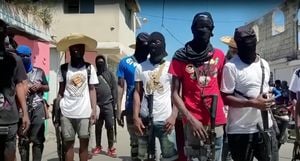On November 18, 2024, the Canadian Parliament made headlines as MPs unanimously condemned what they called a chilling assassination plot against Irwin Cotler, Canada’s former Liberal justice minister and a prominent human rights advocate. The House of Commons officially recognized Cotler's significant contributions to human rights, especially his longstanding stance against the Iranian regime. This incident has drawn attention not only for its severity but also for its reflection of the growing challenges posed by transnational threats to political figures globally.
The plot was reportedly orchestrated by agents linked to Iran, targeting Cotler for his vocal criticism of the Iranian government and his efforts to classify the Islamic Revolutionary Guard Corps (IRGC) as a terrorist organization. This designation was finally secured after months of advocacy and political pressure, particularly following heightened international scrutiny of Iran's activities.
Details surrounding the assassination plot first surfaced through The Globe and Mail, which noted the Royal Canadian Mounted Police (RCMP) informed Cotler on October 26 of the imminent threat to his life—specifically, there was credible information indicating plans for his assassination within 48 hours. Although sources indicated two suspects were identified, it remains unclear if they were apprehended or managed to evade authorities.
This alarming report concerning Cotler has prompted the Canadian government to rally around him. Defence Minister Bill Blair emphasized the importance of national security measures, indicating, "These agencies do their job to protect individuals, especially those who have served the public as parliamentarians."">
Following the threats, Cotler has been under continuous protection. Since the Hamas-led attacks on October 7, 2023, which have exacerbated fears surrounding Iranian affiliations, his security has been significantly elevated, including round-the-clock surveillance and protective details from the RCMP. Notably, Cotler, now 84, has built his legacy on advocating for political prisoners and leading initiatives focused on human rights, extending beyond the borders of Canada.
Despite this precarious situation, Cotler remains unyielding, continuing to speak out against authoritarian regimes. He chairs the Raoul Wallenberg Centre for Human Rights, bringing attention to various injustices, including Iran's treatment of political dissidents. His advocacy work and calls for accountability were instrumental earlier this year when Canada classified the IRGC as terrorists, which Cotler has long argued is necessary.
This foiled plot against Cotler is part of larger concerns about Iranian transnational repression—a tactic employed by the regime to eliminate dissent abroad. Recent investigations, particularly by the Federal Bureau of Investigation (FBI), have revealed Iran's increased use of assassination attempts against expatriates and critics, aiming to not only silence their voices but also send fear rippling through the broader community of activists and opponents.
Experts have weighed in on the serious implications of these developments. Daniel Stanton, former senior manager at the Canadian Security Intelligence Service (CSIS), asserted, "Authoritarian governments often target prominent dissenters to intimidate both them and others. The strategy is simple yet effective: silence critics to deter others from speaking out."
Alan Treddenick, who previously served as CSIS station chief, echoed these sentiments, emphasizing the dangers of governments outsourcing assassination plots to criminal networks as one way to shield themselves from direct accountability. This mode of operation creates significant security concerns not only for targeted individuals but also for the integrity of democratic nations attempting to uphold the rule of law.
Cotler himself, acknowledging the severity of the threat, has highlighted the risks faced by those advocating for democracy and human rights around the world. He warned, "We are witnessing the brutal strategies of authoritarian states waging covert wars against democracies through misinformation, political interference, and targeted violence." This disturbing trend poses urgent questions about the protections available for those challenging oppressive regimes and what steps Canada might need to take to safeguard its citizens.
The international community is currently at a crossroads: as authoritarian regimes operate with little regard for human rights, voices like Cotler's become even more pivotal. His efforts remind us of the dangers persistent within our contemporary geopolitical climate, where the risks associated with speaking against oppressive governments can mean life or death.
B’nai Brith Canada responded to the plot by stating it is not just Cotler under threat, but the fundamental values of Canadian democracy itself. They urged immediate measures addressing extremism and foreign influence, underscoring the need for Canada to protect citizens against actors willing to undermine democratic processes.
Returning to the Canadian Parliament, the Bloc Québécois motion passed overwhelmingly—not only recognizing Cotler's contributions but also serving as a firm rebuke against threats issued by foreign powers. Bloc MP Alexis Brunelle-Duceppe pointed directly at the Iranian regime, stating, "Cotler has drawn the ire of Tehran due to his principled stand against terrorism. This is unacceptable; foreign nations should not be able to orchestrate attacks within our borders."">
The latest information surrounding this foiled Iranian plot emphasizes the urgent need for nations, including Canada, to assess their security frameworks. With the dangers of international political machinations making headlines, Cotler's case could serve as both cautionary tale and rallying point for human rights advocates worldwide. If anything, Cotler's strength shines through as he continues his fight against oppression, proving yet again the power of standing firm against tyranny, even as the threats loom large.
With the political climate growing more dangerous, it also brings to light the necessity for open dialogue on civil liberties, government accountability, and international security policies. Experts agree—only through proactive engagement can democracies hope to preserve their essence against the forces seeking to undermine them.
Despite the evil we confront, Cotler's legacy stands as beacon of hope, serving as reminder behind courage invested during challenging times. Advocates everywhere must fortify their resolve, turn attention to systemic changes, and inspire others to join them if they want to combat hungry powers preying on the vulnerable.



